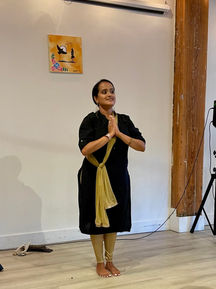CACHARPAYA AND TINKU - APRIL 2025

April 2025
CACHARPAYA AND TINKU
April 7 - 14 -21, 2025
Facilitators: Carolina Rojas, Ximena Loayza
Join us for an exciting three-part workshop that will transport you to the Andean Altiplano, where you will discover two vibrant traditional dances. This free workshop series welcomes all levels, whether you love to dance or are stepping onto the floor for the first time.
Week 1 – Cacharpaya with Carolina Rojas
Carolina Rojas, a seasoned dancer, choreographer, and arts administrator, will guide you through Cacharpaya, a collective Andean dance performed to mark the final farewell to festivities and carnival. Feel the rhythm of community as you take part in this collective dance. Holding hands, moving in sync, and sharing energy, Cacharpaya is all about connection and celebration. With her extensive background in dance education, Carolina will immerse you in the communal joy of this captivating tradition.
Weeks 2 & 3 – Tinku with Ximena Loayza
Learn the dynamic movements of this traditional Bolivian dance, led by Ximena Loayza, a passionate Bolivian dance instructor with over 15 years of experience. Originally a Bolivian Quechua ritual that began as a form of ceremonial combat from North of Potosi, Tinku brings energy, tradition, and storytelling to life through movement. With Ximena’s deep knowledge of Bolivian folklore and her talent for bringing cultural traditions to life, you will learn the dance steps and experience the powerful symbolism behind the Tinku. You’ll also have the chance to wear traditional costumes, immersing yourself in the full experience.
Join us at this space to share, move, and create memories that will stay with you long after the music fades. No dance experience is necessary; just bring your enthusiasm. For those who want to take their experience further and perform, we invite you to join Saturday Mingling on April 26, a lively evening of artistic sharing where community members and artists come together to celebrate the creative journey.
This workshop is free to attend, but spaces are limited, so be sure to register today!
This Dancing workshop is part of Jamii's April cycle, guided by lead artist Carolina Rojas, and centred around the theme of the Chakana—an ancestral Andean symbol representing the connection between the spiritual, earthly, and inner realms. Through these workshops in dancing, painting, crafting, sewing,singing and creative writing, we’ll reflect on how these ancient teachings resonate with our modern lives, connecting us to nature, the cycles of life, and our community. “This is an invitation to reinterpret the meaning of the Chakana, connecting its ancient wisdom with our modern experiences.” – Carolina Rojas.
Photos by Jae Yang, Hadeal Karrar

Carolina Rojas
Carolina Rojas, a dancer, choreographer, and arts administrator. She earned a Dance Interpretation degree from Las Americas University in Santiago de Chile. In 2012, she co-founded 'Danza Independiente Antofagasta,' aiming to expand dance horizons in her hometown. Carolina initiated the 'Interpreters in Dance School' project in 2013, providing free training to aspiring dancers, fostering community growth and education.
Since moving to Canada in 2017, she has expanded her repertoire, contributed to the Dance Migration Company, and volunteered with Chilean associations, sharing her cultural heritage and commitment to community empowerment.
Carolina’s vision prioritizes inclusivity and accessibility, particularly for Latin American communities in Toronto facilitating artist exchanges.
Carolina is not only our Lead Artist for April at Jamii, she is also our Metcalf Intern, managing programs such as Belonging and Laini, excelling in arts management.
Ximena Loayza
For the past fifteen years, Ximena Loayza have been shaping the lives of children and adults through dance. She grew up in a very traditional and cultural country named Bolivia where she learned about Bolivian folklore and traditions. Now as a dance instructor in Canada, she has the pleasure to teach about Latin dances but specially about Bolivian folklore.
Photo by Sabrine S. Hakam






































